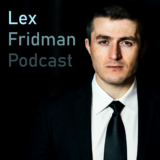New podcast name. New Russian hitman thumbnail. Everything else stays the same. AI is still my passion, but this gives me a bit more freedom to talk to ...
Grant Sanderson is a math educator and creator of 3Blue1Brown. Support this podcast by supporting our sponsors: – Dollar Shave Club: ...
Sheldon Solomon is a social psychologist, a philosopher, co-developer of Terror Management Theory, co-author of The Worm at the Core. Please support this ...
Sara Seager is a planetary scientist at MIT, known for her work on the search for exoplanets. Support this podcast by supporting our sponsors. Click links, get ...
Dileep George is a researcher at the intersection of neuroscience and artificial intelligence, co-founder of Vicarious, formerly co-founder of Numenta. From ...
Russ Tedrake is a roboticist and professor at MIT and vice president of robotics research at TRI. He works on control of robots in interesting, complicated, ...
Manolis Kellis is a professor at MIT and head of the MIT Computational Biology Group. He is interested in understanding the human genome from a computational, ...
Ian Hutchinson is a nuclear engineer and plasma physicist at MIT. He has made a number of important contributions in plasma physics including the magnetic ...
Richard Karp is a professor at Berkeley and one of the most important figures in the history of theoretical computer science. In 1985, he received the Turing ...
Jitendra Malik is a professor at Berkeley and one of the seminal figures in the field of computer vision, the kind before the deep learning revolution, and the ...
- « Previous Page
- 1
- …
- 36
- 37
- 38
- 39
- 40
- …
- 44
- Next Page »

